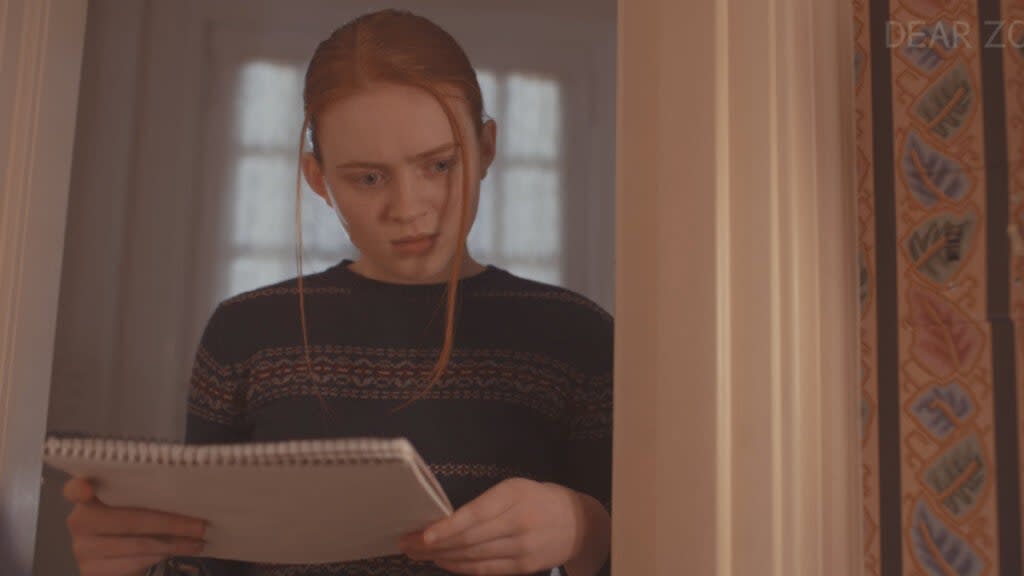‘Dear Zoe’ Review: Sadie Sink Stars in Overwrought Teen Drama

- Oops!Something went wrong.Please try again later.
- Oops!Something went wrong.Please try again later.
- Oops!Something went wrong.Please try again later.
- Oops!Something went wrong.Please try again later.
- Oops!Something went wrong.Please try again later.
If she only could, Sadie Sink might well have pushed for “Dear Zoe” to remain on the shelf that’s been holding it since it was made in 2019. Back then, this ungainly mashup between a YA romance and an old-fashioned Afterschool Special probably looked like a decent bet. Yes, it’s ill-conceived and overwrought. But it gave Sink a chance at her first leading film role, which is tough to turn down.
Since then, of course, Sink has become a small-screen star thanks to “Stranger Things,” and boosted her big-screen cred with a buzzy supporting role in Darren Aronofsky’s upcoming drama “The Whale.” All of which suddenly makes the return of this unfortunate effort a bit awkward.
There is a bright spot, however. Those who seek it out will be the exact audience to which it appears obsessively orchestrated: teenage Sadie Sink fans who adored the 2005 source novel by Philip Beard. And they are, it’s only fair to admit, likely to love it.
Also Read:
Sadie Sink’s ‘Dear Zoe’ Lands Fall Release Date From Freestyle Digital Media
Anyone who does not count themselves among the above demographic may be put off by the tone of adolescent melodrama that is set from the start by director Gren Wells and writers Marc Lhormer and Melissa Martin. This extends into nearly every element, beginning with the clumsy framing that gives the film its title.
Sink plays Tess, a 16-year-old reeling from the recent death of her little sister Zoe. Her intermittent narration is really more of a letter to Zoe, in which she shares the overwhelming grief and guilt she feels. Tess is devastated, of course, but so are her mother Elly (Jessica Capshaw) and stepfather David (Justin Bartha). Communication in their household has broken down to such a dire degree that Tess runs away to stay with her father, Nick (Theo Rossi), who isn’t exactly set up for domestic life. He earns money selling drugs, has a range of strangers wandering in and out of his dilapidated house at all hours, and has never actually done any hands-on parenting.
But he’s chill and kind and genuinely loves Tess. So she moves in over Elly and David’s objections and is soon drinking, smoking and sneaking into the house next door, where the older, flirtatious Jimmy (Kweku Collins) lives. At the same time, though, she starts to process the pain that’s been pushing her away from the world.
Also Read:
‘Stranger Things’ Music Supervisor Who Secured Kate Bush’s ‘Running Up That Hill’ Wins Emmy
Wells (“The Road Within”) is aiming to pull heartstrings vigorously, and thus goes for a very broad approach. Sink’s performance is pitched at a ten most of the way through, which feels like a directorial choice of a piece with the unsubtle script. The subject matter is pretty straightforward, but Lhormer and Martin sketch most of Tess’s experiences as Big Events, while fumbling the novel’s more challenging components. They hit a lot of notes hard and often, like the rough-edged nature of Braddock, Nick’s Pittsburgh neighborhood, and the tension between Tess and her Black coworker Vicky (Tanyell Waivers, “Queen Sugar”), who calls her “Princess.” (A somewhat fair descriptor, as she’s presented.) Most notably, the fact that Zoe happened to die on 9/11 is so poorly handled that it comes across as a regrettable device.
The characterizations are similarly uneven. Sink struggles to shade Tess’ transparent emotions, but because that’s how they’re written, it’s hard to blame her. Capshaw and Bartha are likewise constrained, though they try to find a bit of nuance in the traditional roles of distraught mother and detached stepdad. Collins, a 25-year-old musician, makes a strikingly assured debut as Jimmy, and casting directors should take note for future projects. But he’s so confident and mature that the film’s concerted efforts to make him a clichéd teen-dream bad boy feel misguided.
The same should be true of Nick, but Rossi is both talented and experienced enough to know exactly how to fill out Nick’s jagged charm; as a result, he single-handedly elevates the entire film whenever he’s on screen.
Also Read:
‘The Whale’ Film Review: Darren Aronofsky Handles a Heavyset Character With a Heavy Hand
The movie was shot on location, and though it doesn’t distinguish itself visually, some sharp cinematography (from Joel Schwartz) does add a bit of punch. And the soundtrack — which includes music from Collins as well as indie outfits like Porridge Radio, Haerts, and the Sweeplings — is perfectly matched to the film.
Too much of “Dear Zoe,” though, feels factory-designed to engineer emotion rather than aiming to earn it organically. Then again, what began as a significant step up in Sink’s career is now just a minor detour. She’s proven herself so emphatically over the last year that a modest and underwhelming movie is unlikely to reflect poorly on her. Is it even possible that it’ll provide a small boost, drawing a few more fans to her better work? Stranger things have happened.
“Dear Zoe” opens Nov. 4 in US theaters and on VOD.

